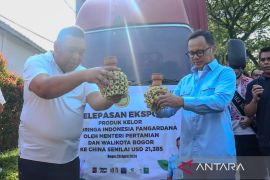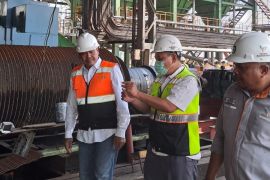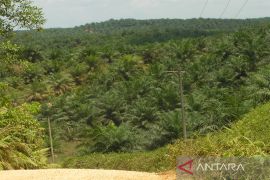"The widespread conflict in the oil palm sector has been building up and become a cause for concern," Arie Rompas, the director of Walhi for Central Kalimantan, said.Jakarta (ANTARA News) - The conflict between farmers and an oil palm plantation company in East Kota Waringin District, Central Kalimantan, needs serious government attention and a review of cooperation between farmers and companies.
In East Kota Waringin District, for example, there has been an incident where local residents forced their way onto a plantation area to seize and harvest the companys nucleus palm oil crop.
Allegedly, the locals were angry as the company failed to keep its promise to provide them with palm plantations. Normally, large oil palm plantations are cultivated under a Nucleus Estate (PIR) system, where the company (which owns nucleus plantation) cooperates with the farmers whose plasm land is outside the nucleus area.
In the PIR system, the company owns 80 percent of the nucleus of the plantation, while the plasm farmers own the remaining 20 percent. They cooperate under a mutually beneficial basis.
In the East Kota Waringin District case, the local people had earlier expressed an interest in an offer made by the company to become plasm farmers and, therefore, they had agreed to use their land. But it remained just a dream and they were left disappointed.
"They handed over their land on promise of getting plasm, but when that did not happen they were angry and forced their way to harvest the plantations. They have no choice. They have lost their original source of income, such as rubber and rattan plantations. There is too little land left for cultivation. They are forced to harvest the oil palm to buy food," Arie Rompas, the director of the Indonesian Environmental Forum (Walhi) for Central Kalimantan, said in Sampit, Central Kalimatan on Tuesday.
Therefore, the government should give serious attention and resolve the problem between the company and local farmers. After all, the farmers in this case did not get their plasm plantation.
With regard to the PIR system, there is also an idea that suggests a change in the 80:20 percentage ratio. The chairman of the Indonesian Farmers Association (HKTI), Mahyudin, said the government should provide the largest portion for the plasm farmers in the plantation sector.
He said that investors control the largest portion of the plantation.
"We should change our mind set. The large estates now have a ratio of 80 percent for the investors and 20 percent for the people. This should be changed," said Mahyudin in Jakarta on Tuesday.
The HKTI chairman argued that the largest portion of the oil palm plantation is controlled by foreign investors, particularly those coming from Malaysia.
The government should now provide an opportunity for the people to cultivate and develop larger portions of plantations. "The 80-20 percentage portion is already out-dated. This is too large for the investors. If necessary, it should be reversed (20 percent for nucleus-80 percent for plasm), Mahyudin noted.
Mahyudin, who is also a deputy of the House of Consultative Assembly (MPR), stressed that Indonesian citizens must become masters in their own houses. They should not merely work as hired farm hands.
Moreover, Indonesia has not yet become self-reliant in food production, thus it still imports most of the food stuff it needs, even though Indonesia is rich in natural resources. Indonesias extensive fertile land is very good for developing agriculture and plantations.
In the oil palm plantation sector, Mayudin therefore suggested that Indonesia would no longer export crude palm oil (CPO). It should be processed first into a finished product, which has high added value.
Further, the countrys oil palm plantations must be cultivated effectively, efficiently and harmoniously between plantation estates and farmers to increase production and process the oil into a high valued added product. The conflict between the company and the local farmers should be resolved soon.
Regarding the conflict in East Kota Waringin District, Central Kalimantan, the environmentalist organization Walhi has asked the local (provincial and district) governments to resolve the disputes lest it escalates into a large-scale conflict in the region.
"The widespread conflict in the oil palm sector has been building up and become a cause for concern," Arie Rompas, the director of Walhi for Central Kalimantan, said. This happened because of a failure to resolve the issue sooner.
Arie pointed out that large scale oil palm plantation was prone to triggering conflicts in the upstream and downstream areas. The restlessness among the locals reflects that they have run out of patience and are too dissatisfied because they see no solution to the dispute.
He urged that the local government should honestly but firmly resolve the conflict. It would be ironical if the local government sided with the company because it had facilitated investment and ignores the interests of the locals.
The local people are waiting for Central Kalimantan Governor Sugianto Sabran to take firm action against companies violating the rules.
Moreover, during the open house event after the recent Ied al-Adha holiday in Sampit on September 12, the governor had reminded large scale oil palm plantation companies to fulfill their obligations, namely providing the farmers with a 20 percent plasm of their plantations.
"The government issued plantation permits to them selectively. If they are reluctant to abide by the regulation, they may leave Central Kalimantan. We do not want them if they are not prepared to pay attention to the local people," the governor had stressed.(*)
Reporter: Andi Abdussalam
Editor: Heru Purwanto
Copyright © ANTARA 2016










